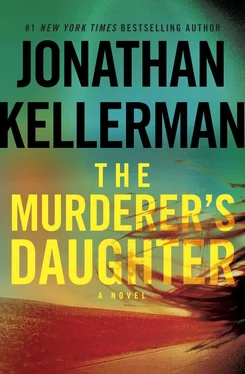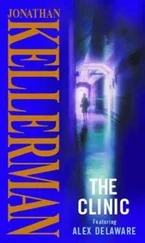“Not at hand, but here’s the reference.” Grace recited and Henke copied.
Grace said, “May I ask a question about the murder?”
Henke looked up. “If it’s something I can answer, I will.”
“On the photo you showed me, there were no wounds.”
“How did he die? Multiple stabbing to the body. That’s one reason what you told me sounds interesting — some low-life relative. Because this was what we call overkill. More wounds than necessary to effect death.”
“Something personal,” said Grace.
“Exactly, Doctor.” But Henke’s eyes had hardened and Grace figured she might’ve overstepped. “If Mr. Toner really was related to a serious bad guy, overkill could make sense. Especially if Mr. Toner was considering ratting him out.”
Trying to put distance between himself and the object of his dread. Good reason to fly in from another city.
Grace said, “Poor man.”
Henke shifted her pad from hand to hand, scanned several more pages. “Or I’m barking up the wrong tree and poor Mr. Andrew Toner was in the wrong place at the wrong time... you mentioned being gone for a couple of weeks.”
“Vacation.”
“Planned a while ago?”
“No specific plans, I just try to take off in order to recharge the batteries.”
“Where you planning to recharge?”
Grace smiled. “I’m open to suggestions.”
“Hmm,” said Henke. “I like Hawaii.”
“I’ll consider it.”
“So no plans yet, but the office will be closed.”
“It will.”
“Mr. Toner knew that but still made an appointment.”
“He was informed but still wanted to come in.”
“That says to me he might’ve intended it to be a one-shot deal.”
“Good point.”
“Is there anything else you can recall about him, Doctor? The slightest detail.”
Grace pretended to ponder. Shook her head. “I’m sorry.”
“Nasty business,” said Henke. “The homeless guy who found him was pretty freaked out — oh, did you happen to see what Mr. Toner was driving?”
“I didn’t walk him out to the street.”
“Why would you?” Henke returned the pad to her bag and stood. “I’m just grasping, Doctor. Thanks again for your time. If you think of anything, even if it seems minor, please call me.”
I’ve thought of plenty. “Atoner,” for starts. Would Henke figure it out? Grace imagined the detective’s reaction if Grace revealed the discovery.
Really, Doctor. You figured that out. Impressive.
A woman paid to see the worst in everyone would view any gift with suspicion.
Grace walked Henke to the mouth of the waiting room, hung back and let her reach the door by herself.
“Good luck, Detective — Elaine.”
Henke said, “Doctor, I’m gonna need it.”
Parting the drapes an inch, Grace watched Henke drive away in a white Taurus, then returned to the therapy room. The space felt different, no longer trustworthy, as if a security code had been breached.
In a sense, it had: This was the first time she’d sat behind her desk, backed by her diplomas and certificates, and been treated as anything other than an expert.
More than that: She had no idea if the meeting with Henke had freed her of this... this... mess. Did the detective still consider her “of interest”?
Had she made matters worse? Planned vacation but no plans? Objectively, it sounded odd. How could anyone, let alone a cop, understand the way she lived?
The big risk was Henke somehow finding out that a dark-haired man wearing tweed and khakis had left the Opus lounge arm in arm with a slim, chestnut-haired woman.
Remote probability, but not zero. Because lacking a real lead, someone like Henke — probably competent but not brilliant, choosing police work in the first place because she liked structure — could be counted on to develop tunnel vision and keep poking at what she had.
One positive: The details of what had taken place in the parking lot would never come to light.
Unless Andrew had told someone...
No reason to think he had, but if Henke somehow managed to connect him to the hotel — face flashed on the news, a newspaper article with accompanying photo — Grace had to face the possibility that someone — Chicklet, another drinker — could cause problems.
The mere fact that Grace had failed to mention the previous meeting would be damning.
Worst-case scenario: a Kafkaesque nightmare.
Best case: career damage.
Had she been overly confident?
Grace felt her gut begin to knot up again. Early-warning sign, like a prodrome before a seizure. She deep-breathed, ran through two circuits of muscle relaxation exercises, achieved mild parasympathetic stimulation, at best.
Forget all that mind-body crap. Keep the brain busy.
Focus.
Two cups of strong tea and the activity it took to brew them helped. So did imagining herself restored to expert status. Sitting in this chair behind this desk in this room.
Her room.
Her world: helping others.
One stupid mistake shouldn’t disrupt that.
So think. How to minimize risk?
She washed her teacup, returned to her desk, closed her eyes, and created a mental list of strategies.
Dismissing all but one. The only plan that made sense was steering Henke away from the Opus with an alternative: Andrew’s actual lodgings.
And for that, microanalyzing Andrew’s behavior might be the key.
He hadn’t stayed at the Opus but he had chosen it for bar snacks and a cocktail. Because his accommodations lacked atmosphere? Perks?
Was his own place limited to cheap booze from a coin-op mini-bar?
Or maybe he was staying somewhere perfectly nice and just felt like a change of scenery.
Either way, the weather had been mild and a young, healthy male from out of town, possibly just off the plane, might crave a pleasant walk.
Then again, he’d been knifed to death downtown. Did that mean his hotel room was in that area?
A cross-city slog didn’t make sense if you were trying to mellow out. So maybe the poor guy had been driven there and dispatched precisely to hinder identification.
His murderer not counting on a card in a shoe.
Why had Andrew done that?
Seeking out Grace’s help but knowing it was dangerous?
She cast that aside and concentrated on the immediate task: find out where and start by keeping it local.
Using the Opus as a hub, she fanned outward and searched for other seats of hospitality. The Internet yielded a list of candidates within four miles of the hotel. The yellow pages filled in missing establishments and soon Grace had compiled a handwritten alphabetic list, pushing aside a flood of intrusive what-ifs.
What if there was no hotel and he’d bunked down with a friend or relative?
What if the pleasant-stroll hypothesis was bunk and he wasn’t weary from air travel because he lived right here in L.A.?
Atoner.
Roger. To Grace’s Helen.
She’d called herself that because a patient by that name was the last person she’d spoken to before embarking. At the time, a cute little in-joke. Now it seemed tawdry. What if Andrew had employed a similar ruse? Something that might help identify him.
Could he have been that devious? Grace’s bullshit detector was exquisitely tuned but he hadn’t set it off. Was she slipping? Or would Andrew turn out to simply be a decent man seeking help?
Murderer’s son/brother/cousin inspired by the tale of a murderer’s daughter.
No sense wondering. She had a job to do.
Using the same airhead persona she’d presented to the Opus clerk, she began calling.
The Alastair, a “six-star guesthouse” on Burton Way, was fronted by a warm-voiced man. Regretfully, that establishment hadn’t accommodated Andrew Toner nor anyone named Roger.
Читать дальше












